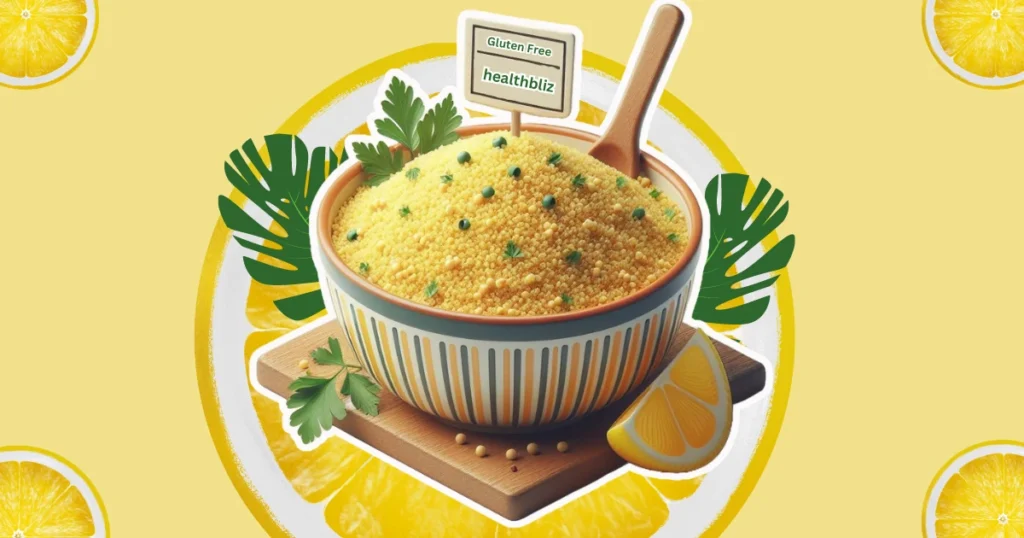
Couscous, a dish consisting of small pasta spheres, has multiple applications, such as being used in grain-based salads, soups, or as a foundation for stews. Considering its resemblance to different grains, one might question its suitability for consumption on a gluten-free diet. This article investigates the compatibility of couscous with a gluten-free diet and presents alternative options.
What Is Couscous?
Couscous, a classic dish originating from North Africa, is crafted using small grains of durum wheat or semolina flour. It’s a staple food in many North African countries and is enjoyed worldwide for its versatility and unique texture. Despite its grain-like appearance, couscous is actually a type of pasta.
Couscous itself possesses a mild flavor that harmonizes excellently with robustly seasoned sauces and other components. This versatile ingredient can be found in various Middle Eastern and Mediterranean cuisines, as well as in salads and certain stews.
Additionally, it is commonly incorporated into stir-fries, where it is combined with an assortment of vegetables, meat, and spices.
Is couscous gluten-free?
Is couscous gluten-free? In simple terms, despite its rice-like appearance, traditional couscous is not gluten-free as it is primarily made from semolina, which contains gluten. It is worth noting that couscous is often mistaken for a gluten-free ingredient in restaurants.
Therefore, if you are in search of a gluten-free option, it is advisable to opt for a different dish instead of couscous.
However, it is important to acknowledge that couscous offers several benefits despite its gluten content. It serves as a source of plant-based protein and is commonly used in vegetarian dishes to enhance nutritional value.
Furthermore, couscous is known for its delicious taste and ease of preparation, making it enjoyable for most individuals, unless they have an allergy to it.
Gluten-Free Alternatives
While there may be gluten-free options, such as cassava-based couscous or those made with corn or tapioca starch and egg whites, they do not appear to be widely available.
As a result, most people will probably prefer to use a gluten-free alternative to couscous that can be used in the same way.
Some similar but gluten-free alternatives to couscous are:
- Quinoa: Quinoa is a nutritious gluten-free grain high in protein, fiber, and essential vitamins and minerals. It has a slightly nutty flavor and fluffy texture, making it an excellent substitute for couscous in recipes.
- Millet: Millet is a gluten-free ancient grain that is gaining popularity for its nutritional benefits. It has a mild flavor and a slightly crunchy texture, making it a good substitute for couscous in salads, pilafs, and side dishes.
- Riced cauliflower: Riced cauliflower has become increasingly available and can now even be found in frozen form. With its neutral flavor and gluten-free nature, cauliflower serves as a suitable substitute for couscous, boasting a comparable shape and texture.
- Short-grain rice: Naturally free of gluten, is a convenient substitute for couscous in various dishes. Despite its slightly sticky texture, its adaptable nature and similar shape enable you to easily transform your favorite recipes into gluten-free alternatives.
These alternatives can be utilized as substitutes for couscous in a majority of recipes, offering a comparable shape and structure while being gluten-free.
People Also Like To Read: Chia Seeds in Hot Coffee Benefits
Recipe for homemade cornmeal couscous
Interested in making your own gluten-free couscous? Give it a go with cornmeal as a substitute.
Ingredients
- 1 cup (198 grams) of cornmeal
- 2 tablespoons (30 mL) of olive oil
- 1.5 cups (360 mL) of water
- pinch of salt
Instruction
- In a large pot, mix the cornmeal, salt, and olive oil.
- Combine the water and heat until boiling.
- Reduce the heat to a simmer, stirring occasionally, for about 12 minutes, or until the grains are dry to the touch.
- Remove the pot from the heat. Once cooled, transfer the couscous to a new pot and fluff it with a fork. Large clumps may need to be broken up with a food processor.
Frequently Asked Questions
Q1: Are chickpeas gluten-free?
A1: Yes, chickpeas are naturally gluten-free.
Q2: How do you cook couscous?
A2: To cook couscous, simply boil water or broth, add couscous, cover, and let sit for 5 minutes.
The bottom line
Couscous, a versatile grain product with a neutral flavor, is traditionally made from semolina wheat. It is commonly used in various dishes, such as salads, soups, and stews.
Although couscous made from wheat contains gluten, there are alternative options available. Several variations of couscous are created from gluten-free alternatives like corn, fermented cassava, or a combination of potato or tapioca starch and egg whites.
If you prefer to completely avoid gluten, you can opt for gluten-free substitutes for couscous. Quinoa, short-grain rice, and sorghum are similar to couscous in terms of properties but do not contain gluten. Alternatively, you can experiment with making your own couscous using cornmeal.
To ensure you are avoiding gluten, it is important to carefully read the ingredient label when selecting couscous or other grain products. This will help you determine whether they contain gluten or not.
People also like to read:


